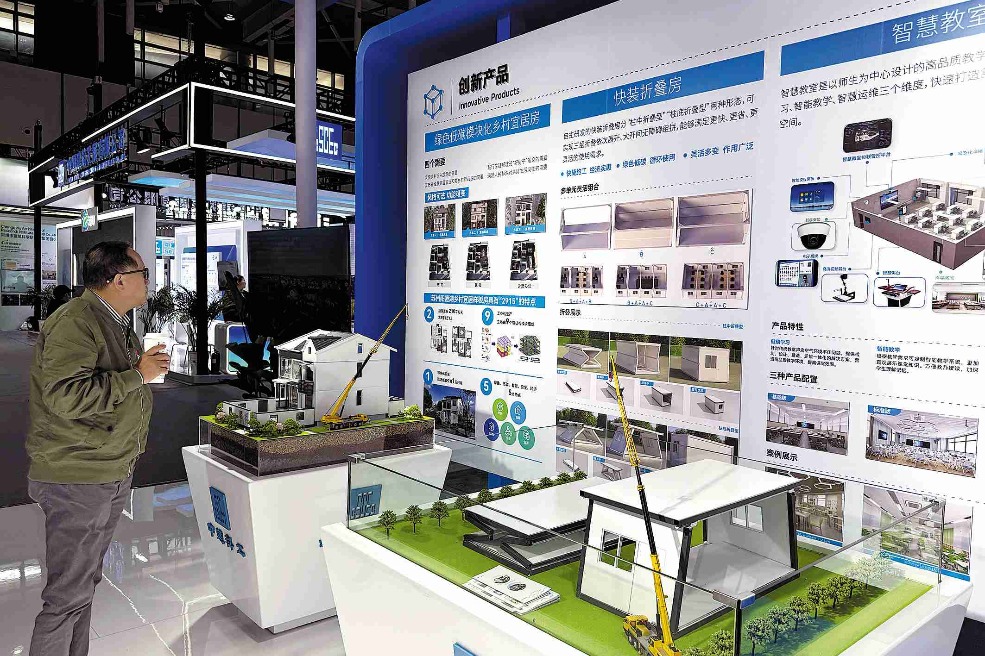Some Chinese electric car makers mull alliance to save money, time

 |
| A visitor looks at an Iconiq Seven multi-purpose vehicle at the Shanghai auto show on April 19, 2017. [Photo provided to China Daily] |
A handful of China's many electric vehicle (EV) start-ups are considering setting up an alliance to pool resources, develop joint technology and bring cars more quickly to the world's biggest auto market.
In a sign that the country's fledgling EV industry is already consolidating as rules get tougher and competition fiercer, Shen Haiyin, co-founder and CEO of Singulato Motors, said his company and four others - CHJ Automotive, Hongxing Automobile Manufacturing Co, AIWAYS and WM Motor - have discussed an alliance for months.
Keen to push for cleaner energy cars, in part to combat air pollution and a dependence on imported oil, Beijing wants 8 percent of automakers' sales to be new energy vehicles (NEVs) - battery electric or plug-in hybrids - by next year, rising to 12 percent in 2020, according to latest draft proposals released last month.
Sales of NEVs this year are forecast by the China Association of Automobile Manufacturers at around 700,000, roughly 3 percent of the overall Chinese auto market.
Shen, known as Tiger Shen, told Reuters the start-ups aim to finalize the move by end-September with the aim to start developing a common EV platform by the end of this year.
As the industry shifts towards smart, internet-connected, battery cars, with electrified powertrains, it's increasingly hard for automakers to differentiate, he said.
"Just like smartphones, whose gut is the same Android operating system across many brands, smart EVs should compete more on ownership experience and services," Shen told Reuters.
The move to pool resources and know-how highlights how Chinese start-ups are scrambling to save time and money in developing products as they face increased pressure from established global automakers shifting into a new market, so far led by Tesla Inc.
Also, Chinese policymakers have put on hold approving new EV ventures because of concern that some start-ups have cut corners on technology or have set up just to access attractive subsidies. Regulators are reviewing licensing procedures and may bring in tougher technical requirements early next year, three EV start-up founders and executives told Reuters.
Freeman Shen, co-founder and CEO of WM Motor, reckons the prospect of tougher new technical requirements is a big factor spurring start-ups to consider an alliance to develop basic vehicle technology.
"The government worries about some new start-ups, thinking some of them actually don't have the technology and management expertise to be a legitimate player," he told Reuters. "This shows start-ups need to work together to face competition from traditional automakers."
David Jin, spokesman for AIWAYS, said the Shanghai-based start-up "welcomes cooperation within the industry permitted (under) Chinese law and anti-monopoly law and technical exchanges. We need to make a decision after we get further information." The company's CEO Fu Qiang declined to comment on any alliance talks, referring questions to Jin.
A spokeswoman for CHJ Automotive and an official at Hongxing Automobile declined to comment.
Despite years of effort to reduce costs for traditional gasoline-fuelled cars through common vehicle platform technologies, these are still often designed separately for different car models.
"Gasoline car platforms are often over-designed," said Singulato's Shen. "Who needs cars with platforms that allow you to do a high-speed U-turn or slalom? While we want to design an advanced platform for plug-in battery cars, we don't want to make platforms excessively overspeed."
WM Motor's Shen said he supports the idea of an alliance, but is unlikely to be part of it, for now, as his company's first vehicles are to be based on vehicle architecture it has already developed itself.
Singulato's Shen said combining resources would allow alliance members to develop a far more advanced vehicle technology, and for less money.
"Let's say each player planned to spend 200 million yuan ($30 million) to develop a next-generation platform; if four players each threw in 100 million yuan, we'd all save money but end up with a 400 million yuan platform rather than a 200 million yuan platform," he said, "the benefits are clear."
He said that if the alliance does take shape, it would set up a separate company to oversee platform development, and ask independent automotive engineering companies around the world to bid for a contract to help in advanced vehicle technologies that could be shared among alliance partners.
Alliance partners would also share, and possibly jointly procure from outside suppliers, basic car platform parts like axles and suspension.
"We plan to ask component suppliers to join the joint venture, too," Tiger Shen said.




































